Related Research Articles

The Macariini are a tribe of geometer moths in the subfamily Ennominae. Though they share many traits with the Sterrhinae, this is probably plesiomorphic rather than indicative of a close relationship, and DNA sequence data points to the Boarmiini as particularly close relatives of the Macariini. All things considered, this tribe might still resemble the first Ennominae more than any other living lineage in the subfamily.

The Bistonini are a tribe of geometer moths in subfamily Ennominae. As numerous ennomine genera have not yet been assigned to a tribe, the genus list is preliminary. In addition, the entire tribe is sometimes merged into a much-expanded Boarmiini. In other treatments, the Erannini are included in the present group.

The Ourapterygini are one of the large tribes of geometer moths in the subfamily Ennominae. The tribe was described by Charles Théophile Bruand d'Uzelle in 1846. They are particularly plentiful in the Neotropics. Ourapterygini are generally held to be the youngest tribe of their subfamily, and at least seasonally have characteristic apomorphic asymmetrical processes of the anellus.
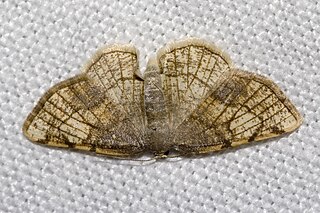
The Abraxini are a tribe of geometer moths in the subfamily Ennominae. Here, the Cassymini are considered a specialized offshoot of the Abraxini and merged therein; some authors consider them a distinct tribe however.
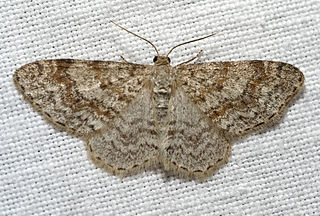
Larentiinae is a subfamily of moths containing roughly 5,800 species that occur mostly in the temperate regions of the world. They are generally considered a subfamily of the geometer moth family (Geometridae) and are divided into a few large or good-sized tribes, and numerous very small or even monotypic ones which might not always be valid. Well-known members are the "pug moths" of the Eupitheciini and the "carpets", mainly of the Cidariini and Xanthorhoini. The subfamily was described by Philogène Auguste Joseph Duponchel in 1845.
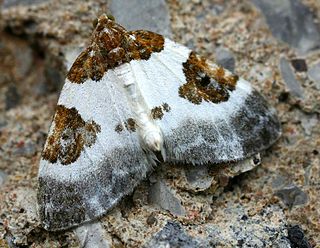
The Cidariini are the largest tribe of geometer moths in the subfamily Larentiinae. The Cidariini include many of the species known as "carpets" or, ambiguously, "carpet moths", and are among the few geometer moths that have been subject to fairly comprehensive cladistic study of their phylogeny. The tribe was described by Philogène Auguste Joseph Duponchel in 1845.

Asthenotricha is a genus of moths in the family Geometridae.
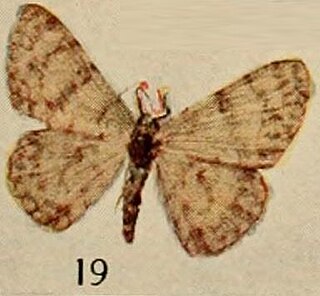
Dorsifulcrum is a genus of moths in the family Geometridae erected by Claude Herbulot in 1979.

Heterorachis is a genus of moths in the family Geometridae described by Warren in 1898.

Heterostegane is a genus of moths in the family Geometridae described by George Hampson in 1893.
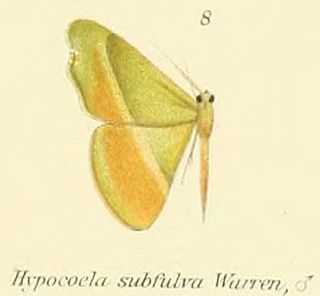
Hypocoela is a genus of moths in the family Geometridae described by Warren in 1897.
Omphax is a genus of moths in the family Geometridae erected by Achille Guenée in 1858.
Parortholitha is a genus of moths in the family Geometridae erected by Claude Herbulot in 1955.

Pingasa is a genus of moths in the family Geometridae first described by Moore in 1887.
Psilocerea is a genus of moths in the family Geometridae described by Max Saalmüller in 1880.

Scopula is a genus of moths in the family Geometridae described by Franz von Paula Schrank in 1802.

Somatina is a genus of moths in the family Geometridae first described by Achille Guenée in 1858.
Claude Herbulot was a French entomologist. He was born in Charleville-Mézières and died in Paris. He was a lepidopterist and specialised in moths in the family Geometridae. His collection is housed at the Zoologische Staatssammlung München.
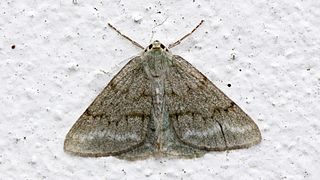
The Pseudoterpnini are a tribe of geometer moths in the subfamily Geometrinae. The tribe was described by Warren in 1893. It was alternatively treated as subtribe Pseudoterpniti by Jeremy Daniel Holloway in 1996.
Haplolabida viette is a species of moth of the family Geometridae first described by Claude Herbulot in 1970. It is found in northern Madagascar.
References
| This Ennominae-related article is a stub. You can help Wikipedia by expanding it. |